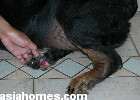Asiahomes
Internet educational stories for pet lovers,
sponsored by AsiaHomes
Internet
The vet refused to make house calls
anymore
"The vet who had been here three times now refused to come any
more and had asked me to use the pet transport
service," Mr Chan said in the Cantonese dialect. "The pet taxi person
charges
$50.00 for the transport of the dog to-and-fro and this would
cost me more."
Mr Chan, a big man in his late fifties was the type with broad
shoulders and a size which fitted perfectly and comfortably in
his big Mercedes, was brutally frank.
The first veterinary surgeon had just set up his first practice
which was within a one-minute drive to the house. The vet's house-call
charges as displayed in his surgery was fifty - sixty dollars.
It did not
make sense for Mr Chan to pay the pet transport man fifty
dollars. Why pay more when an animal doctor
charges the same amount as the animal taxi person? The
latter may injure his Rottweiler in the process of moving too?
This was sound economics and sensible practice for the baby
boomer generation.
In times of recession, the customer is king and will go for
the least cost service provider. To win more accounts, newer
practitioners under price the established competitors. They do
build up the practice fast
and then become too busy to make it worth their while to make house
calls which can take as long as one hour including travelling
time.
I approached the Rottweiler carefully as I had been attacked
before while vaccinating one of the nervous looking type which
was not controllable by the owner. It bit me on my ankle just after I had
vaccinated him.
Will this one bite even though he could not lift up his head
more than 30 cam from the tiled pavement? He was down
but not out and had been lying on his right side for
the past five days. On his large swollen right fore limb.
A Sri Lanka maid cared for him, feeding him and giving him
water and keeping him very clean. He had normal appetite and
normal bowel and bladder movements but was recumbent on one
side and would not stand up.
"As you can see, this Rottweiler is too heavy to be transported to a
veterinary surgery for examination." Mr Chan justified the
need for a house call. I did not say anything but he was
right. It would need two men to lift the overweight Rottweiler
on a stretcher.
Did the big dog fracture his leg when the younger dog jumped onto him?
Was there any hope of recovery using drugs? Many Singaporeans
believe that drug injections can cure many medical problems in
their dogs.
I palpated his spinal area cautiously and ascertained there
was no spinal injury. Using finger pressure, I could detect
the painful areas. As I proceeded to press on his left shoulder
area which was upper most, Mr Chan interrupted with a louder
than usual voice,
"Doc, his right fore limb is the problem area."
Mr
Chan pointed his right forefinger exasperatedly to this part of the
canine anatomy to me, as if I was a blind veterinarian. Was it
not obvious and why was I fiddling away his time checking on
the other body parts of his beloved dog? What he wanted were
injections as the problem was obvious.
This was the
first time he had met me and would not know that I had a small
animal surgery.
Maybe I should have presented my credentials such as a name
card and resume and not just sauntered into his house without
the trusty black bag of a Singapore doctor dressed in long
sleeves and a tie. And a stethoscope hanging round his neck.
Short sleeves and no ties did not make good impressed Mr Chan.
Maybe, a veterinarian should wear bow ties, white long-sleeved
shirt, black pants and shiny black shoes and sport a moustache
to command respect. Like a professor.
 Mr
Chan had phoned Mr
Formicelli, the breeder who sold him the dog, for help after the
first veterinarian did not
want to make house calls any more. Mr Formicelli's groomer,
Jenny had asked me to follow up. I seldom make house calls as
most Singaporeans would not want to pay more. The dog would be
more aggressive at its home and the owner may not be able to
control it. Furthermore, the dog might run out of the house
and the owner would not be paying a cent, since there was no
case to treat! Mr
Chan had phoned Mr
Formicelli, the breeder who sold him the dog, for help after the
first veterinarian did not
want to make house calls any more. Mr Formicelli's groomer,
Jenny had asked me to follow up. I seldom make house calls as
most Singaporeans would not want to pay more. The dog would be
more aggressive at its home and the owner may not be able to
control it. Furthermore, the dog might run out of the house
and the owner would not be paying a cent, since there was no
case to treat!
Mr Chan had controlled his impatience. "I have to check all
parts of the body, whenever possible," I explained to Mr
Chan. "His left shoulder area which looks normal on the
surface, is extremely painful too and that was why he did not
want to lie down on his left side for the past five
days."
The big dog could not swing his jaws to bite me as he felt the
intense pain when I touched his left shoulder. Rottweilers are
dangerous dogs. Excellent guard dogs not to be under
estimated.
"Where is your doctor's black bag of drugs?" Mr Chan
asked incredulously probably suspecting that I was not a
veterinary surgeon. I did not carry my bag into his house as I
parked my car outside his
house. I was not in a hurry and therefore had thought of
seeing the dog first before taking out my paraphernalia.
Mr Chan must be used to doctors carrying a
bag on house calls and probably wondered whether I was a bona
fide veterinarian.
To alleviate his concern about my professionalism, I
explained, "I treat horses too and my drugs are kept in a
multi-drawer container inside the boot." I quickly went out
and carried in a drawer full of bottles of drugs for equine
treatment and which, of course,
included drugs for his dog too. To Mr Chan, they were
horse drugs since I had said I treated horses but had not said
I treated dogs too.
The Rottweiler had a serious sprain high up on his right fore
limb, most likely the muscle injuries, leading to bleeding
internally and swelling. This condition was seen in horses
after a severe traumatic injury during exercise. The whole
limb would be swollen, like an elephant's leg.
Would the drugs used to treat such a condition in horses work
in this Rottweiler at the appropriate dose? These drugs
are recommended for canines too but most dog and cat
veterinarians would not have stocked such drugs. After all,
such cases in the dog due to traumatic injuries are very
rare.
I decided to use the same medical treatment as I would have
done for the horse.
Mr Chan was asked to turn the dog to rest
on the other side every six hours to prevent pressure sores
and lung congestion due to lying on one side for so many days.
I inserted a long piece of towel under his chest and pulled
him out on the other side. The maid and I tried to pull
him out and turn him on his left side. It was not
possible.
Anyway, he had lots of fat and should not get pressure
sores.
Did the painkiller injections work? They do very well for
horses. This was the first time I had tried on a dog. I told
Mr Chan to continue with the medication and the vitamins
provided by the first veterinarian and left.
Two
weeks later, Mr Chan popped by at my surgery to ask for more
vitamins and the antibiotics which had been prescribed by the
first veterinarian. He said his dog was a bit
lethargic but his dog could now walk but preferred to
sit down.
"There is no need for antibiotics or vitamins," I said.
"Reduce his weight. Don't give him so much of your soup
from your table as they could be fatty," I said.
 "He
always asks for food," Mr Chan said sheepishly. He really
loved this big dog to go through all the trouble to get a
veterinarian to do a house call and now he wanted the
multivitamins to pep up his
best friend. "He
always asks for food," Mr Chan said sheepishly. He really
loved this big dog to go through all the trouble to get a
veterinarian to do a house call and now he wanted the
multivitamins to pep up his
best friend.
"It must be the equine drugs you used," he
acknowledged. What worked for horses would
definitely be more potent and work for dogs with traumatic
injuries. Actually the drugs were also meant for dogs too
at the appropriate dose.
 I
had to go to his house to check as I did not give a
good prognosis for this Rottweiler who had been recumbent on
his right side for five days. Some pragmatic owners would
recommend euthanasia as the dog was old and had cost them more
veterinary treatment fees. But not Mr Chan. I
had to go to his house to check as I did not give a
good prognosis for this Rottweiler who had been recumbent on
his right side for five days. Some pragmatic owners would
recommend euthanasia as the dog was old and had cost them more
veterinary treatment fees. But not Mr Chan.
I was not able to converse with the maid but her face glowed
with the happiness of a person who had good news of good
health.
The dog rolled up his eyes to
full alert status and was wary of me. He was not
pleased to see me. Would he pounce on me to take revenge for
the injections? I had to be careful not to antagonise him.
Definitely, the drugs had worked to reduced swelling and pain
and the old friend could now live a normal life again. As for
the big growth below his toe, a simple operation could remove
it but I dared not take any anaesthetic risk on this fat dog.
Mr Chan just purchased the anti-fly powder to get rid of
flies.
I met Mr Formicelli's groomer later. She knew I had charged
one hundred dollars for the house-call.
"You charged too low," she said as she puffed her
fifteen cigarette for the day. "Mr Chan can afford the
fees. Why didn't you "kutup" him?"
I presume "kutup" is a Malay word and meant
"slash" meaning to charge Mr Chan higher fees as he lived in
a house and owns a Mercedes. He could therefore afford to pay for house calls
unlike pet owners who live in public housing.
"I rather not make house calls as saving money is
important to the cost- conscious Singaporean pet owner and
besides it is dangerous to handle aggressive dogs and I may
not have the relevant microscope or equipment to help me make
a diagnosis." I said to Jenny.
___________________
Internet Advertisement
House owners:
You got tenant?
If not, place an affordable targeted asiahomes.com
internet ad for $13.50 for 90 days, not just one
day as in the newspaper.
You may get the agents to call you and close
early so that you can rent out faster and let the
tenant pay for your mortgages.
Why not place an affordable internet ad
to contact prospects direct and save you
a few thousand dollars in agency commission?
Telephone +65 9668 6468, judy@asiahomes.com
Asiahomes Internet, Affordable Internet Ads for
Singapore Owners & Realtors,
$13.50/40 words/90days targeted at expatriates
relocating to Singapore. Visit http://www.asiahomes.com to
select your rental housing units or to view over
2000 photographs and layout plans.
Copyright © Asiahomes Internet, 2003. All rights
reserved.
Revised: March 19, 2003
· Asiahomes Internet
HOW TO
ADVERTISE? | WHY
ADVERTISE? | FAQ
| EMAIL
ADVERT
|